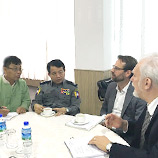 7 October 2016 - In recent days, UNODC, together with senior government officials from the Republic of the Union of Myanmar - including the Union Minister of Home Affairs and the Chief of Police - gathered in the country's capital, Nay Pwi Taw, to begin work on developing the country's first ever comprehensive national crime prevention strategy. The purpose of the strategy is reducing crime and violence across the country while also contributing to the implementation of the
Sustainable Development Goals.
7 October 2016 - In recent days, UNODC, together with senior government officials from the Republic of the Union of Myanmar - including the Union Minister of Home Affairs and the Chief of Police - gathered in the country's capital, Nay Pwi Taw, to begin work on developing the country's first ever comprehensive national crime prevention strategy. The purpose of the strategy is reducing crime and violence across the country while also contributing to the implementation of the
Sustainable Development Goals.
The initiative follows the United Nations General Assembly's recommendation for Member States to adopt a comprehensive and integrated approach to crime prevention based on baseline assessments and data collection and focusing on all sectors of the justice system.
Participants in the two-day workshop represented the spectrum of government ministries and agencies, with discussions focused on understanding crime prevention policies and programmes - including the identification of existing norms and best practices, and familiarization with international standards. Crime trends and risk factors were identified by the Myanmar Police Force to help ensure that the final strategy is evidence-informed and responds to local, national, and regional nuances. Importantly, approaches to integrate and mainstream norms and practices into national policy were also canvassed.
"It is vital that the National Crime Prevention Strategy is comprehensive, balanced, and evidence-based," said Troels Vester, UNODC Country Manager for Myanmar. "A whole of government approach will, therefore, be fundamental to ensuring that causal and risk factors associated with crime are targeted. Ultimately, the strategy will seek to build on the existing strengths of communities and Myanmar's justice system, while responding to current gaps."
"Putting a comprehensive crime prevention strategy into place is one of the top priorities of the new Government," said Lt. General Kyaw Swe, Myanmar's Minister of Home Affairs. "Accordingly, the Government remains committed to identify and address gaps, and see the development process through."
For his part, Major General Zaw Win, Chief of the Myanmar Police Force (MPF), mentioned that crime and community safety challenges in his country are complex. He added: "I have asked all the key ministries to join in this first inter-agency workshop so they can take advantage of the technical expertise and assistance offered by UNODC, and that we work towards a strategy that addresses the needs of our citizens. This effort is connected to our wider engagement with UNODC on police reform and capacity building."
Participants in the workshop also pinpointed strategic priorities and elements that would prove vital in the implementation of the planned strategy. These deliberations, and indeed all of the input from the workshop, are set to form the policy core of the crime prevention strategy due to be formulated by UNODC at the end of the year.
The Workshop was jointly organised by the Ministry of Home Affairs and the Myanmar Police Force, and was attended by senior representatives of the Ministry of Border Affairs, Ministry of Information, Ministry of Religious Affairs and Cultures, Ministry of Health and Sport, Ministry of Education and other relevant Ministries, as well as the Union Attorney General's Office, The Myanmar National Human Rights Commission and other affiliated organizations.
The MPF was represented by the Commanders of all State and Regional Police Units and specialized units such as the Criminal Investigation Unit the Drug Enforcement Division and the Anti-Trafficking in Persons Division.